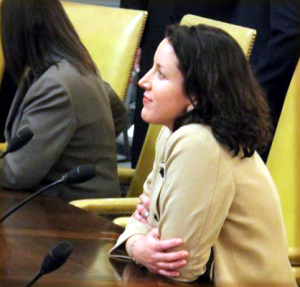By State Senator Katy O’Connor Ives – March, 2018
 One of the most important issues limiting our state’s economy as a whole, and families and residents individually, is the issue of childcare.
One of the most important issues limiting our state’s economy as a whole, and families and residents individually, is the issue of childcare.
The state of our economy is directly connected to the state of child care options for the work force. Though Massachusetts was one of the first states to form a dedicated Department of Early Education and Care, we are plagued by some of the highest costs in the country. Childcare is shockingly expensive and that has a whole set of related impacts on the economy. Relatedly, caregivers earn poverty wages, with a whole additional set of related impacts on the economy.
As such, the state of childcare in Massachusetts, like the rest of the nation, isn’t working for anyone—not for families, nor for care providers.
The average cost for childcare in Massachusetts for full-time infant care is $17,062 per year according to a survey of data by Child Care Aware of America. Child care costs are the most significant household expenses to a family. By federal standards, day care is affordable for less than one in every five Massachusetts families.
The average cost of full-time care in child care centers for all children ages 0-4 in the United States is $9,589 a year, higher than the average cost of in-state college tuition. In order to cover the cost of full time in-center care for one child, a family earning at the median household income would need to spend one-fifth of its income. For an individual earning the minimum wage, full time in-center care costs 64 percent of their earnings. In Massachusetts, full-time care is greater than 90 percent of the typical cost of rent. For most families, childcare is like paying a second mortgage every month.
Child care is considered affordable if it costs no more than 7 percent of a family’s income according to federal standards set by the U.S. Department of Health and Human Services. The poor state of childcare and early education in Massachusetts means that families must calculate whether it makes sense for both parents to work, despite education, qualifications, professional interests or work responsibilities. The math just doesn’t work.
Additionally, on account of the hard work and low salary, qualified early education caregivers are hard to find, hard to keep, and often have to work second jobs. Daycare teachers’ pay is grossly inadequate for the work and educational requirements needed. In 2015, the median wage for childcare workers in Massachusetts was $12.01 per hour. Thirty-nine percent of the state’s childcare workers are on public assistance because of the inadequate compensation and the state’s high cost of living. As state subsidies for child care have lagged over the years, some early education centers can’t afford to stay open or are admitting fewer children.
Some Child Education and Care Centers offer tuition on a sliding scale, based on ability to pay, and then make up for that lost revenue through private donations and fundraising. However, that takes a lot of time and effort, is unpredictable, unreliable, and not directly related to their main mission of educating and caring for young children.
Despite the costs, about 69% of Massachusetts families with children under six years of age have both parents in the labor force, according to data provided by Strategies for Children. That means these young families have much less money available for emergency reserves and savings. That means it’s that much harder for these families to save for a down payment to purchase a first home. It also means they have less disposable income available, which also negatively impacts state revenues.
At the State House, our responsibility is to address challenges related to our state’s economy through our jurisdiction as legislators. The most powerful tool available to us is our authority to legislate and fund state budget priorities. We in the legislature must fight for more funding to support early education if we’re truly committed to strengthening the state of our economy. Moreover, we must raise compensation for the professionals we entrust with some of our most vulnerable little residents. And, we need to offer free-tuition for those seeking early education degrees, so they at least won’t be saddled with debt when they opt for these low-paying professional paths.
If we address this problem, we address three challenges at the same time. First, we could make valuable work possible for those parents who seek to contribute to the state’s economy. We would improve and expand the profession of early education and care, which is also directly beneficial to our local economies. And, we would be in a stronger position to maintain high standards of safety, education and care for children so their life-long educational futures can be made as strong as possible. They will then have the tools they need as early as possible to realize their full potentials and will undoubtedly in turn contribute to the future economy and quality of life of the Commonwealth.
Senator O’Connor Ives can be contacted at: KATHLEEN.OCONNORIVES@MASENATE.GOV
